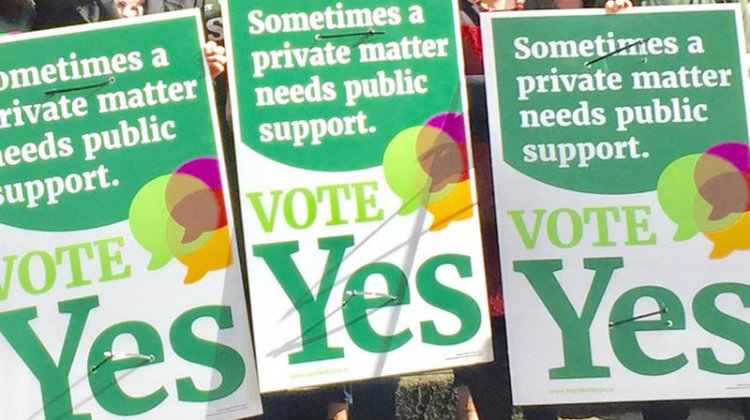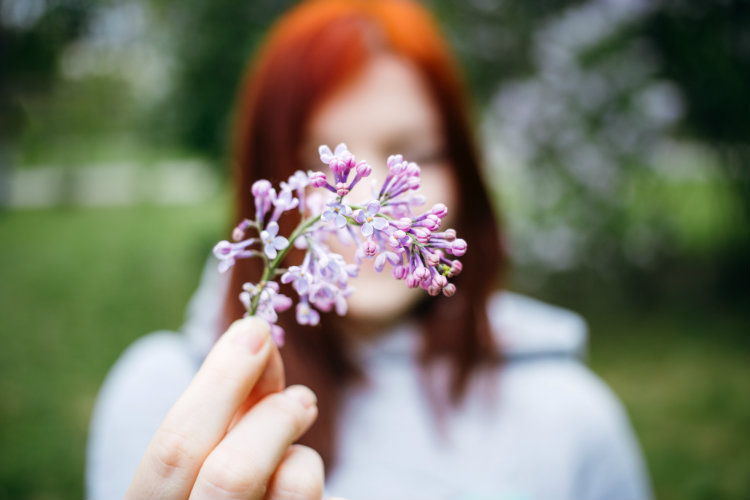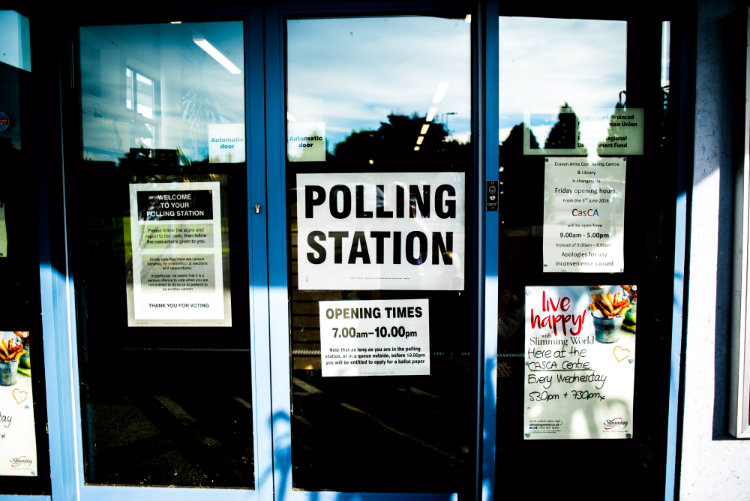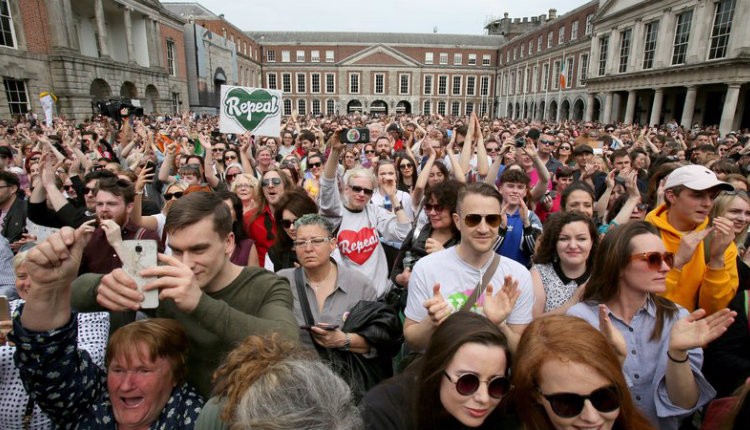Change Comes In May | May 26th 2018
1.
May is my favourite month. The days stretch out improbably and the skies clear and you can just believe that perhaps the sun might shine for the whole summer long. It’s all promise and opportunity, and if it rains you can still call it spring and cling to the possibility of a real summer to come. Lucy and I cycle along the canal from Rialto to Clondalkin, trying not to inhale the low clouds of midges hanging on the water. We squeeze through kissing gates erected to prevent quad bikes from tearing up and down the tow paths, elder flower dusting the air and swans huddling clannishly against early evening drinkers. This strange environment hums with insects and immense factories, for Dublin 12 is an industrial zone made up of motorways, housing estates, and retail parks.
We’re cycling to canvass for a Yes vote in the referendum. For six weeks, I’ve made this small commitment: one canvass a week, knocking on doors to talk to people about the 8th amendment and hopefully to persuade them to vote to repeal it. So here we are, in the final week of the campaign, in a housing estate in Clondalkin.
Dublin, it’s widely predicted, will carry the yes vote easily, but this does not mean that there is no opposition. One young man is aggressive to my canvassing colleague, then starts shouting at all of us, scattered along his road. “You should all be ashamed of yourselves! You’re murderers!” A woman leans out of an upstairs window to check our bona fides before descending to open the door – she deflates immediately when I utter my script “We’re out with Together for Yes canvassing for a Yes vote in the referendum on Friday”.
“Oh” she says. “No.”
And she closes the door deliberately. We check her in the No column on our tally sheet.
Others greet us with jubilance: “We’re canvassing for a Yes vote…”
“- You’ve got one!”
Constitutional amendments and the referendums they demand are a commonplace of Irish democracy. Sometimes they are dense and technical, shoehorned in on the back of a local or general election; sometimes, like now, they take centre stage, dominating the media for weeks and months on end. As the badges and the car stickers, the posters and the jumpers proliferate about me, I find it hard to imagine that anybody could remain uneducated or undecided about abortion in Ireland – but it is those people we are looking for when we go out to canvass.

2.
May is the month of Mary. Like most Irish people I know, I went to a convent school, where devotion to Mary was encouraged – although I would hate you to get the idea that it was an especially theological environment. Religion was in the water and the air, and so extravagant Catholicism was uncalled for. By the mid-eighties, there were few enough nuns left in the convent on our generous school grounds. We learned Catholicism and we learned Aesop’s fables, and although it was unquestionably indoctrination, it was a gentle sort. I knew that Mary was a virgin long before I knew or cared what a virgin was, and I knew that being a virgin was a good thing and so was being a mother, and so was being the Mother of God. At this time of year, one corner of the classroom would be taken up with a May altar: a table with a white cloth, a picture or statue of Mary, and some flowers. In my memory, it is easily confused with a nature table, and I’m sure that’s what it became, seashells and bunches of lilac or buddleia wrapped in tinfoil and browning at the edges disrupting the doctrinal orthodoxy of the Holy Mother’s shrine.
I made my first holy communion on Saturday the 12th of May, 1984. I wore the same short white dress that my sister had worn for her communion three years older – the trend at the time was for ankle-length communion dresses, which my mother considered inappropriate for little girls. She disliked dressing her daughters up as brides, and she was determined not to let on that the white dresses were supposed to represent our purity, nor that the veils encouraged proper female modesty. The morning of my first communion ceremony, we discovered that my baptismal candle was lost, so my Dad had to run out to a hardware shop to buy a tall upright candle. I remember fretting about my hardware store candle, that it would prove insufficiently sacred, but in the event it was just as good as all the other ones.
Exactly a week later, my Dad, at the age of 48, dropped dead unexpectedly of a heart attack. Four days after that, I turned seven. May is the best month, but I have to confess, it’s rather intense.
Dad was a supporter of the 8th amendment, as was Mum. For a period in my early teenage years, I took to wearing his pro-life badge, a pair of tiny brass feet the size, supposedly, of a baby’s at 12 weeks of pregnancy (or 10 weeks of gestation, as I have learned to point out. One thing about a referendum campaign is that you become very expert in the technical details of your subject). It was easy to be pro-life in Ireland in the early ‘90s, it took a lot of knowledge to see things any other way. I wore my teeny tiny feet as a way of holding on to the father I didn’t really know; at the same time, I was actively encouraging every adult I knew to vote for Mary Robinson for president. I knew nothing about life or womanhood or pregnancy or babies. It may be the case that we, as a society, knew nothing.

3.
My birthday falls towards the end of May, and I will always think of it as exam time, since for about ten of my most formative years, that was the defining feature of the season. I was good at exams and I liked studying, so it suited me for early summer to be defined by tests, although of course I pretended to worry and be burdened by the opportunity to show off my only skill. In the run up to the exams, I sat with books and highlighter pens under horse chestnut trees in Belfield, loving the ebullient greenness and the exquisitely proud creamy pink candles standing upright against the leaves.
In 1998, I sat my final exams in UCD. Myself and three friends went for lunch in one of the business-friendly pubs opposite the RDS in Ballsbridge, where students were an oddity but for these two weeks of early summer. Approaching the end of our exams, we chose to celebrate that lunchtime with 4 shots of tequila. The waitress, in a show of just how unused to serving students she was, brought us four pots of tea. We laughed ourselves almost sick, and drank the tea as well as the tequila.
One of the tequila gang had an abortion that summer. I knew about the abortion but not what to say – I had spent the holidays in the States, and missed the moment. She confronted me in my house months later, insisted on discussing the experience that I had not acknowledged. I was floored and nervous, but listened obediently. She told me the story I had never even asked about, of choosing to to take the boat rather than fly so that she would feel each step of her journey, of being let down by the friend who’d offered to accompany her, and travelling alone. I didn’t understand any of it. I was wrapped up in my own grief that summer, and somehow failed to comprehend any loss that wasn’t death by cancer. Death by cancer was a well-established story, while taking a boat to England was just a thin trope, a euphemism for a solution, not a story in its own right. Her narrative glanced off me and we didn’t talk about it again. I respected her more because of it, but I didn’t understand. I still didn’t know how to understand.
Looking back, I was surrounded then by unintended, disastrous pregnancies. I saw them all through a horrendous prism: “thank god it wasn’t me.” I grew up scared of pregnancy, a biological terror that might impose itself on me at the slightest provocation. The few highly technical descriptions of sex that I received in school did not preclude the possibility that pregnancy might result from wayward sperms wriggling their way up my vagina as a result of a really good snog. Still, by college, I felt strongly that I needed to be having sex, notwithstanding the fear.
I didn’t judge the crisis pregnancies that littered my college years, but each and every one, however it ended, presented itself as a bullet I had managed to dodge. Each month that my period came and I was not pregnant, I celebrated a tiny victory. This, I thought, was how you did young womanhood: a mad dash through sexual fireworks, preserving your wholeness and independence with condoms and taboos. Whatever you do, don’t get pregnant.

4.
In May of 1976, my Mum was recovering from an operation for slipped discs. I have no idea what was wrong, or how serious it was, but a key item of our family lore is that she was told by doctors that if she had any more children, she risked being in a wheelchair for life. One year later, I was born. I don’t know in what context this story was told to me: was it a reason for my family’s pro-life stance; or an example of my mother’s super-human strength; or indeed a demonstration of what a cold place Ireland could be for women, who would be advised not to have more children, and legally compelled to keep on having them, regardless. At any rate, I grew up the youngest child, ever aware that I was an accident, or as my siblings had it, a mistake.
Believe it or not, this fact returned to me for the first time in decades in Clondalkin this week, waiting at the edge of a large suburban green with a crowd of canvassers. In another country, in another time, mine was not a pregnancy that would have continued. Did it give me pause? Barely. My parents might never have met, the pregnancy might have gone terribly wrong, my mother might have become pregnant a month earlier, or a month later, with a baby that was not me, not the me I am now, not the me that grew up inherently, instinctively Catholic, able to say that my opinions were not religious because religious attitudes ran so deep they were invisible.
We are all highly improbable accidents of circumstance, and no laws or constitutional amendments can game that reality. I am here now, thanks to my mother, who risked and sacrificed everything for me because (and here I feel myself slipping into an essentialism I still can’t quite escape) that is what mothers do. It seems utterly absurd that we would use something as artificial and arcane as the constitution to compel women to risk and sacrifice everything for their children.

5.
Ireland is what’s sometimes termed a pro-natal society. Although parenthood isn’t especially respected or supported, motherhood is still treated as a sacred state. Sex education delivered to 12 year olds is still more likely to focus on making babies than having relationships or respecting bodies, one’s own or those of others.
We teach our children about the rhythm of the seasons, a strange thing in cool damp Ireland where the weather barely varies and the summer is distinguished above all by the quality of the light, the stretching days and the cinematic glow of evenings that go on for hours. We look to nature to teach children about birth and growth and death, and for so long, we taught them about motherhood in this way. School books featured pastoral scenes with animals and their babies: cows and sheep and horses; and sometimes, alongside the farmyard scenes, happy families with happy chubby children. I talked to my kids about adult women we knew and said: “She has a baby in her tummy. She’s going to have a baby.”
When we got pregnant, confident educated women in our thirties, we downloaded apps that told us about what was going on in our uteruses: Your baby is the size of a peanut; your baby is the size of an apple; your baby is the size of a bunch of grapes. We held our breath. The app didn’t say Your baby is most likely to miscarry at this point; or If your pregnancy fails now, it will be messy and uncomfortable; but we knew that to be true also. We didn’t tell anybody about the baby until it started making its presence visible around our waistlines.
And then this referendum campaign happened, and women started talking about having babies in their tummies. They spoke about how hard that was, and how at times it made them sick, sick in the body and sick in the head. Their babies who died. The medics who ignored them, forced them to undergo procedures against their will. The babies they couldn’t bear to have, the ones they didn’t. The things they did to avoid pregnancies, the things they did to end them. It became apparent that the language we use to talk about pregnancy and motherhood was insufficient. It was somebody else’s language, language that elided the bodily experience of pregnancy and suggested that it was, at worst, a temporary inconvenience that women would just need to suck up, since birth is magnificent and conception is life. While I was out knocking on doors, women sat in kitchens and bars, cafes and classrooms, and told each other things that they had never said before.

6.
I had the first scan for my only pregnancy in the month of May. My team at work brought me out for lunch for my birthday, and I had two pieces of news, a joke and a punchline. One: I was pregnant. And two: I was expecting twins.
Seeing the scan of two babies in the hospital was a devastating moment. In an instant, the dreams I hadn’t even noticed myself conjuring evaporated, and I became heavily aware of the demands of my own body. I imagined myself, bound day in and day out by two bleating infants squalling for my breasts. My self-image as a laid-back, baby-wearing, go-anywhere Mum vanished because how did you even transport two babies? The idea of family planning seemed at that moment absurd, and I accepted that I have no control over anything.
My husband, for his part, was delighted. It wasn’t his body the babies would be occupying.
Early in the second trimester, when I still doubted the veracity of the scan, I had a nosebleed. My husband observed in horror as my nose pumped out voracious, comical spurts, a melodrama of fecundity.My body was producing extra for the entities who had invaded it: extra blood, extra fat, extra hormones and flesh and god knows extra emotion. I was appalled. Happily pregnant yet blind with fear and panic, I wondered at the alienation that this bodily response must cause to a person who doesn’t accept their pregnancy.
As it turned out, my fear at the prospect of having not one but two babies proved to be both accurate and completely naïve. Having a baby is like being hit by a truck, and I’ve grown to believe that you might as well be hit by two trucks at the same time, and get it over with. It was, however, the experience of gestating and delivering two babies that convinced me of a woman’s right to choose.

7.
As the month matures and the swallows multiply on wires, I grow nervous about the outcome of the campaign. I speak to a young couple with four children and a puppy, a couple I instinctively like. “I’m sorry, no. That’s murder.” Doors are closed in my face and people look at me with disappointment. “No. I’m voting no. I’m voting no to abortion.” I remember all the maybes and all the Nos. The Yesses – apart from the ones who gave me home baking – I greet their Yes with joy and encouragement, and move on. I worry that it’s not enough. I worry that I haven’t done enough. Until I stop worrying.
The vote was on a Friday. By Thursday I think, my anxiety lifted. Although I could certainly have done more for the campaign, every time I showed up, there were 40 people there before me. Every gap seemed to be plugged, every need met eventually by volunteers and activists. When social media showed hundreds and thousands of people arriving in repeal jumpers in Dublin airport to vote yes, it became evident that it was ok, the vote wasn’t going to be nearly as close as the media was calling it.
On Friday I was crossing the road near my house with my son. A woman at the traffic lights clocked my repeal badges, glanced down at her own. She asked me: “Have you voted yet? Are you nervous?”
And I told her that no, I wasn’t, not any more.

8.
Today I am in the children’s hospital with my seven year old son, for whom May will always be the month when he fell off his bike and fractured his elbow, and perhaps the month in which Mummy was out canvassing for Repeal. He doesn’t know about the Virgin Mary, I don’t believe he’s ever heard of her. He knows the words for the intimate parts of his body, and he does not believe his body is mysterious or sacred or wrong. It’s a physical thing, to use and to know, and hopefully to love. He was holding my hand when we met the woman in the Yes badges at the traffic lights. She was a stranger, but I felt a connection with her. We were united for an instant in our agreement that bodies matter, but their meaning isn’t ours to determine.
This year there was barely any spring: we slipped from a long soggy winter into strange emergency weather (storms, snow) that belonged in no Irish season, into, overnight, the early summer. The cultural symbols of the season are a perfect mix of new and old: communion dresses, confirmation parties, bouncy castles and elaborate cupcakes, small children in Sunday clothes with scruffy knees.
For how much longer will we teach those children that pregnancy is a natural and blessed state, rather than something mucky and grubby and occasionally miraculous? For how much longer will we set them unattainable goals, related to their sexed bodies instead of their infinite spirits? For how much longer will we couch sexual activity in terms of conquest and achievement, instead of self-knowledge and growth?
Not much longer now. The summer is coming, and even if it rains throughout, it’s full of light.
